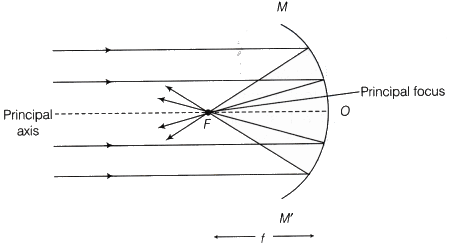Lab Manual: Focal Length of Concave Mirror & Convex Lens | Lab Manuals for Class 10 PDF Download
Objective
To determine the focal length of concave mirror by obtaining the image of a distant object.
Materials Required
A concave mirror, a mirror holder, a small screen fixed on a stand, a measuring scale and a distant object (a tree visible clearly through an open window).
Theory/Principle
The spherical mirror with inward curved reflecting surface is called concave mirror. A beam of light generally converges after reflection from its surface, hence it is also called convergent mirror (Fig. 1).

Reflection by Concave Mirror
A concave mirror obeys the laws of reflection of light. In a concave mirror, rays of light are parallel to its principal axis and meet at a single point on the principal axis, after reflection from the mirror (as shown in Fig. 2). This point is the principal focus of the mirror.
The distance between the pole and principal focus of mirror is called, focal length of the mirror. Fig. 2 Incident parallel rays of light are parallel to principal axis
Fig. 2 Incident parallel rays of light are parallel to principal axis
Image of Distant Object
When a parallel beam of light coming from a distant object, such as tree or pole is incident on the reflecting surface of a mirror, then after reflection, the rays converge at its principal focus as shown in the Fig. 3.
 Fig. 3 Incident parallel rays are not parallel to principal axis
Fig. 3 Incident parallel rays are not parallel to principal axis
A distant object (at infinity) when reflected by a concave mirror, forms a real, diminished, and inverted image at the focus of the mirror.
As the distance between the pole 0 of the concave mirror and the focus F is the focal length of the concave mirror. Thus, the focal length of a concave mirror can be estimated by obtaining a real image of a distant object at its focus.
To obtain the position of image for a given object distance and focal length of a mirror, the following mirror formula can be used.
1/f = 1/v + 1/u
where, u = object distance,
v = image distance and f = focal length.
All u, v and f should be according to sign convention.
This expression is valid for concave as well as convex spherical mirrors.
Procedure
- Fix a concave mirror in the mirror holder and place it on the table near an open window. Turn the face of mirror towards a distant object (suppose a tree).
- Place the screen, fitted to a stand, infront of the concave mirror. Adjust the distance of screen, so that the image of the distant object is formed on it as given in the figure below. We can infer from the figure that a clear and bright image could be obtained if the distant object (a tree), is illuminated with sunlight and the screen is placed in the shade. A bright image of the Sun could also be obtained, if the sunlight is made to fall directly on the concave mirror.
- When a sharp image of distant object is obtained, then mark the position of the centre of the stand holding the mirror and the screen as (a) and (b), respectively (see Fig. 4).
 Fig. 4 Determination of focal length of a concave mirror
Fig. 4 Determination of focal length of a concave mirror - Measure the horizontal distance between the centre of the concave mirror and the screen with the help of a measuring scale.
- Record the observations in the observation table.
- Repeat the experiment two more times by obtaining the images of two different distant objects and measure the distance between the concave mirror and the screen in each case. Record them in the observation table.
- Find the mean value of the focal length for all the observations for different objects.
Observations and Calculations
Least count of scale used = …………. mm = …………. cm
 Focal length for first object (f1) = ………… m
Focal length for first object (f1) = ………… m
Focal length for second object (f2) = ………….. m
Focal length for third object (f3) = …………. m
Mean focal length = (f1 + f2 + f3)/3 ...........m
Result
The approximate value of focal length of the given concave mirror is ………… m.
Precautions
- Concave mirror should be placed near an open window through which sufficient sunlight enters, with its polished surface facing the distant object.
- There should not be any obstacle in the path of rays of light incident on the concave mirror.
- If the image of the Sun has to be formed, then it should be focused on the screen only. The image of the Sun should never be seen directly with the naked eyes. Sunlight should never be focused on any part of the body as it can burn it.
- In order to obtain a sharp and clear image of the distant object on the wall/ground, it must be ensured that the object is well illuminated, so that amount of light incident on the concave mirror is sufficient to produce a well illuminated and distinct image.
- The measuring scale should be parallel to the base of both the stands.
- The mirror holder along with the mirror should be kept perpendicular to the measuring scale for precise measurements.
Sources of Error
- The measuring scale may not be parallel to the base of both the stands.
- The mirror holder, along with the mirror, may not be kept perpendicular to the measuring scale.
- Least count of measuring scale may not be correctly noted.
- Measurement of distance from pole may not be made accurate.

|
Explore Courses for Class 10 exam
|

|


















